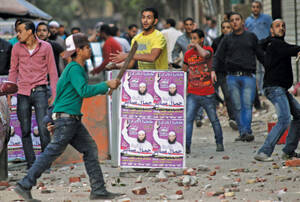The explosion of sectarian tensions that followed the U.S. invasion of Iraq in 2003 has led, almost eight years later, to the devastation of Iraq’s Christian minority. Over the years since Saddam Hussein was driven from power, at least 54 churches have in Iraq been bombed and 905 Christians killed in various acts of violence. Fewer than 500,000 Christians remain in Iraq; as many as 900,000 have fled. Now some Christians in Egypt wonder if the recent parliamentary elections there suggest a similar fate is in store for that Arab nation’s ancient Christian community, now denied the protection of the deposed strongman Hosni Mubarak.
An estimated 100,000 Coptic Christians have already emigrated since Mubarak’s ouster, according to the Egyptian Union of Human Rights Organizations. Coptic churches have been the targets of repeated, sometimes deadly assaults; and the suppression by the Egyptian military of a demonstration led by Copts in October led to 26 deaths. In the first round of voting for a new parliament in early December, the biggest winner was the Muslim Brotherhood’s Freedom and Justice Party, with 37 percent of the vote. But the big surprise was the success of the Hizb al-Noor (Party of Light), backed by the extremist Salafist Islamists, which received 24 percent of the vote. A group of secular parties received about 25 percent.
The Rev. Antoine Rafic Greiche, an official spokesman for the Catholic Church in Egypt, said, “We were expecting the Muslim Brothers to do well, but we did not expect at all the success of the Salafists.” He called the election results “a cause for alarm not just for Christians but for moderate Muslims, who will be very annoyed by what has happened.”
The Coptic Catholic bishop, Kyrillos William of Assiut, Upper Egypt, said: “We have to wait and see what happens next. The secular and liberal parties are very young and they may develop as time goes on, collecting more support.”
Father Greiche said the Salafists “look at Christians and even moderate Muslims as Kuffars,” a derogatory term for non-Muslims, “and say they want to implement the Shariah Islamic law rigorously.”
Father Greiche said Salafists had taken responsibility for a number of attacks on churches. “The Salafists’ attitude to Christians is to say that they can get their passport to go to the U.S.A., France, the U.K. or somewhere else in the West,” he said.“They always talk about Egypt as a Muslim country, even though there are up to 13 million Christians living here.”
That figure is a source of hope for Stephen Colecchi, director of the Office of International Justice and Peace at the U.S. Conference of Catholic Bishops, although he acknowledges the U.S. church’s continuing concern for the Christian minority in Egypt and other “Arab Spring” nations. Iraq’s Christians were no more than 2 percent of the population, he said. The Coptic Church alone constitutes as much as 10 percent of the Egyptian population, and its historical and cultural roots go deep.
“It’s hard to assess the situation from here,” said Colecchi, who acknowledged that attacks on Christian churches were disturbing but seemed to be the work of “a fringe element.”
“Generally there are relatively good relations between Muslims and Christians in Egypt,” he said. Colecchi expects to know more after he consults with Christian leaders in January, when he will join Bishop Gerald Kicanas of Tucson in Egypt as part of the Holy Land Coordination meeting.








